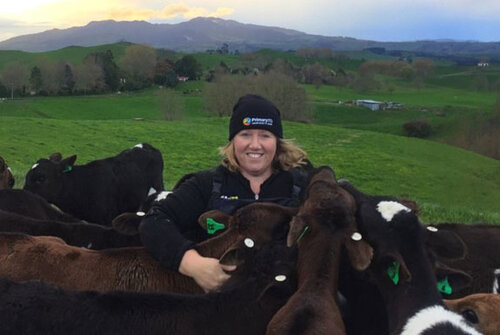Self-Employed Dairy Farmers Urged To Study Diploma
16 September 2019
Taking control of your finances is a crucial skill that many self-employed dairy farmers struggle to master.
 Anna Yarndley knows all too well the stress involved after she and her husband went lower order share milking and spent the next four years spiralling into debt.
Anna Yarndley knows all too well the stress involved after she and her husband went lower order share milking and spent the next four years spiralling into debt.
“My husband was very good with the cows but financially when it came to our business we had no skills whatsoever. We had never been self-employed before and we didn’t understand our costs properly. So we were always going backwards but we just couldn’t see it.”
The Waikato couple eventually switched to a management role instead and in 2001 Anna enrolled in Primary ITO’s diploma to upskill herself. The couple had decided to venture back into self-employment and wanted to ensure they didn’t repeat past mistakes.
The Waikato couple eventually switched to a management role instead and in 2001 Anna enrolled in Primary ITO’s diploma to upskill herself. The couple had decided to venture back into self-employment and wanted to ensure they didn’t repeat past mistakes.
“The big draw of the diploma was to actually be in control of our finances and look at job opportunities critically and know whether we could actually make some money and get ahead.
“It was a light bulb moment for us. The diploma put us back in the driver’s seat and helped us become more professional in our approach. We went from having no control in job interviews to being able to selectively choose where we wanted to go because we could do the background research and put together a budget to know whether it was a good opportunity for us or not.”
The diploma is split into five different modules – human resource management, business planning, financial management, resource management and a property report which pulls together all the skills previously learnt into one professional analysis.
Anna discovered a passion and talent for people management which she didn’t know she had. “The HR paper gave me so much confidence and the skills to manage all our recruitment ourselves. I learned how to do everything from writing a job ad to interviewing people and checking references. I discovered I was good at sussing people out beyond what they had written in their CVs.”
The financial and business planning skills have also proven invaluable. They have allowed the couple to focus on an agreed future direction and have made conversations with bank managers and farm owners much easier. “We know now where we want to go and have set goals and a budget to achieve it.”
Like many diploma students, Anna hadn’t studied for many years and was worried whether she would cope with the fortnightly class sessions and regular assessments. “I wasn’t the best student at school and I did think ‘am I smart enough to do this’? But you feel so empowered when you pass your first assessment. You also develop a strong network among your classmates and your tutors are always available to help when you get stuck.”
In addition to study, Anna worked part-time on the farm and had three young children to look after. The most challenging aspect was to juggle all these commitments and make study an equal priority. “Some people put off homework or assignments because they’re busy, but learning is probably more important than other everyday tasks. You have to be disciplined and not feel guilty about sitting down to study.”
For every 4.5 hour classroom session, Anna says to expect between 4.5 and 9 hours of homework or background research. “I always found it helpful to do my homework straight away while it’s fresh in your mind. Otherwise things can snowball.”
The arrival of baby number three in the middle of her diploma meant Anna took six years to complete her qualification. While she would recommend finishing it faster than that, the flexibility that Primary ITO offers is a big plus.
Anna now works at Primary ITO overseeing the dairy farming apprenticeships programme. She firmly believes that any farmer who is considering self-employment should upskill themselves with the diploma before diving in.
“So many people get into lower order share milking or contract milking and don’t understand the financial side of things. So they end up in the same situation we were in – getting burnt and unable to make any money. Everyone wants to be their own boss but you need the right skills so you can be rewarded for your work.”
Anna believes having the will and enthusiasm is the most important requirement for success.
“Sometimes the biggest barrier about starting the diploma is you. Give it a go. A lot of people are scared to study again but most of your classmates are in the same boat. The diploma is all about giving you skills and self-confidence because when you’re self-employed, you have a lot on the line financially.”
